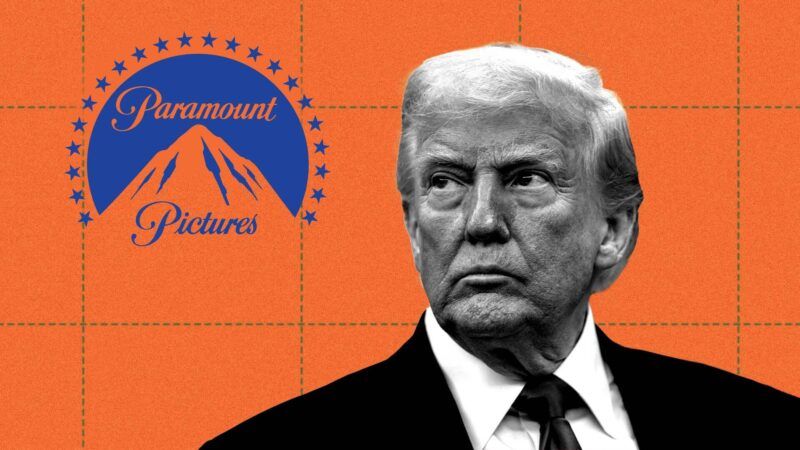Trump Wants $25 Million To Settle His Meritless 60 Minutes Lawsuit
In a legal filing this week, Trump argued that routine edits to a CBS News interview he did not participate in caused him "confusion and mental anguish."

President Donald Trump is currently suing one of the largest media companies in the country because one of its subsidiaries lightly edited an interview with his political opponent. This week, he apparently declined a settlement offer, even though the lawsuit itself is completely frivolous and arguably an abuse of his power as president.
"Paramount Global in recent days has offered $15 million to settle," The Wall Street Journal reported this week. "Trump's team wants more than $25 million and is also seeking an apology from CBS News."
The whole affair stems from an October 2024 interview that 60 Minutes conducted with then-Vice President Kamala Harris, the Democratic candidate for president. (Trump declined the chance to sit for a 60 Minutes interview of his own.)
In the interview, correspondent Bill Whitaker asked about Israel's war in Gaza. CBS—the broadcast network owned by Paramount—aired separate portions of Harris' answer, one on the 60 Minutes broadcast and a longer snippet on its Sunday morning show Face the Nation.
Trump seized on the different clips and accused CBS of doctoring Harris' answer to make her look better. "Her REAL ANSWER WAS CRAZY, OR DUMB, so they actually REPLACED it with another answer," he wrote on X.
"They took the answer out in its entirety, threw it away, and they put another answer in," he later said at a campaign rally. "And I think it's the biggest scandal in broadcasting history."
Trump sued CBS for $10 billion in "compensatory damages"—amended to $20 billion after he won the election and reassumed the presidency—under a Texas law against deceptive consumer practices. The lawsuit accused CBS of "unlawful acts of election and voter interference."
The lawsuit was flawed from the start: Journalists editing interviewees' answers for time or clarity is both routine and protected by the First Amendment.
And Harris' answer in either clip is not exactly Churchillian: "Harris did not come across as especially forthright, articulate, or intelligent in either version, although the one that 60 Minutes showed was a little more concise," Reason's Jacob Sullum observed. If CBS were trying to do her a favor by swapping out her answer, one imagines they could have done a better job.
Besides, Trump won the election; it's hard to believe he suffered any damages, much less millions of dollars worth. But in a filing this week, Trump's lawyers argued the interview "led to widespread confusion and mental anguish of consumers, including [Trump]."
CBS released the full unedited video and transcript of Whitaker's interview with Harris in February, conclusively demonstrating the scandal was bullshit all along: CBS aired one part of Harris' response on 60 Minutes and another part on Face the Nation. Despite Trump's insistence, nobody "replaced" any part of her answer with another, separate answer.
But instead of defending its journalists by pressing on and letting a judge laugh the lawsuit out of court, Paramount has been negotiating a settlement. CBS News staffers opposed a settlement, fearing the precedent of a journalistic outlet caving to pressure from the powerful interests it covers. Since negotiations began last month, the producer of 60 Minutes and the executive in charge of CBS News each resigned.
But Paramount is in the process of being acquired by Skydance Media, and the transaction requires approval from the Federal Communications Commission (FCC). Around the same time as Trump's lawsuit, the Center for American Rights, a conservative nonprofit, also filed an FCC complaint for "news distortion" over the interview. And FCC Chair Brendan Carr, whom Trump elevated to the job and who has demonstrated unabashed loyalty to the president, has indicated that approval depends upon the resolution of the complaint, which he is in no hurry to get through.
"It would be entirely inappropriate to consider the complaint against the '60 Minutes' segment as part of a transaction review," FCC Commissioner Anna Gomez told the Los Angeles Times.
Indeed, the lawsuit—especially when paired with the FCC merger approval—smacks of corruption, with Trump trying to cow a disfavored media outlet into silence. Trump's effort is so blatant that Paramount executives reportedly worried they could be prosecuted for bribery of a public official if they settled the lawsuit.
Of course, this puts Paramount, CBS, and 60 Minutes in a perilous position: If Paramount—which has been struggling for years—hopes to save itself through a merger with Skydance, it must win over the FCC, whose current head apparently delights in being referred to as "Trump's media pit bull." Doing so will apparently require bending the knee and paying a fee for hurting Trump's feelings, even though by all accounts, 60 Minutes violated neither the law nor journalistic ethics.
And if Paramount does cave and pay $25 million or more—worse still, if it apologizes for the sin of doing basic journalism—it will set a dangerous precedent that powerful people can openly and unabashedly bully the journalists who cover them into silence.


Show Comments (64)